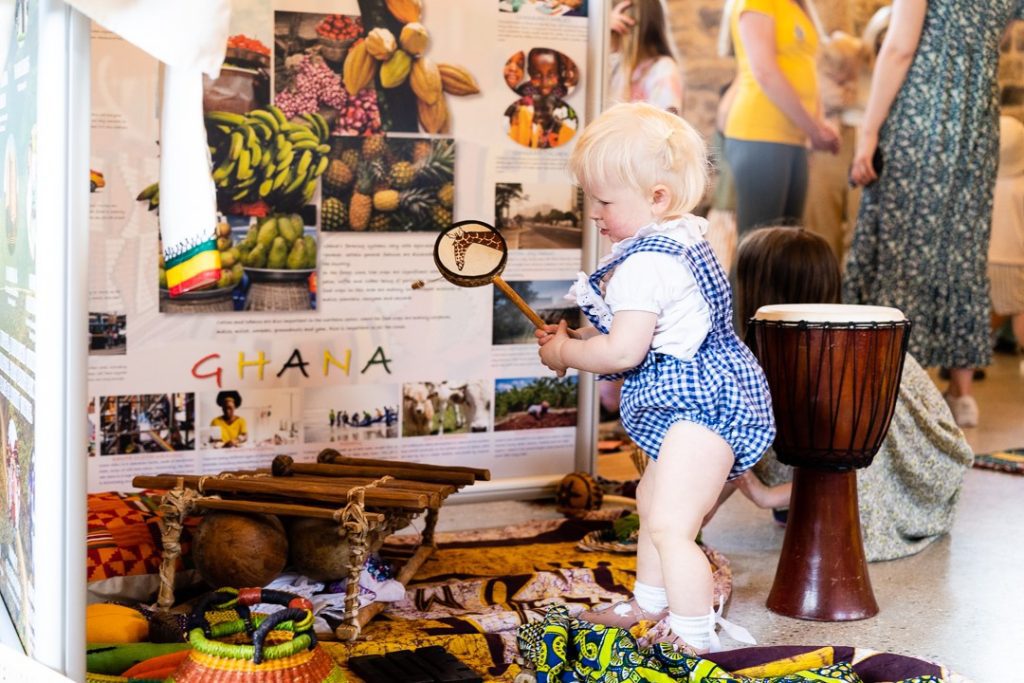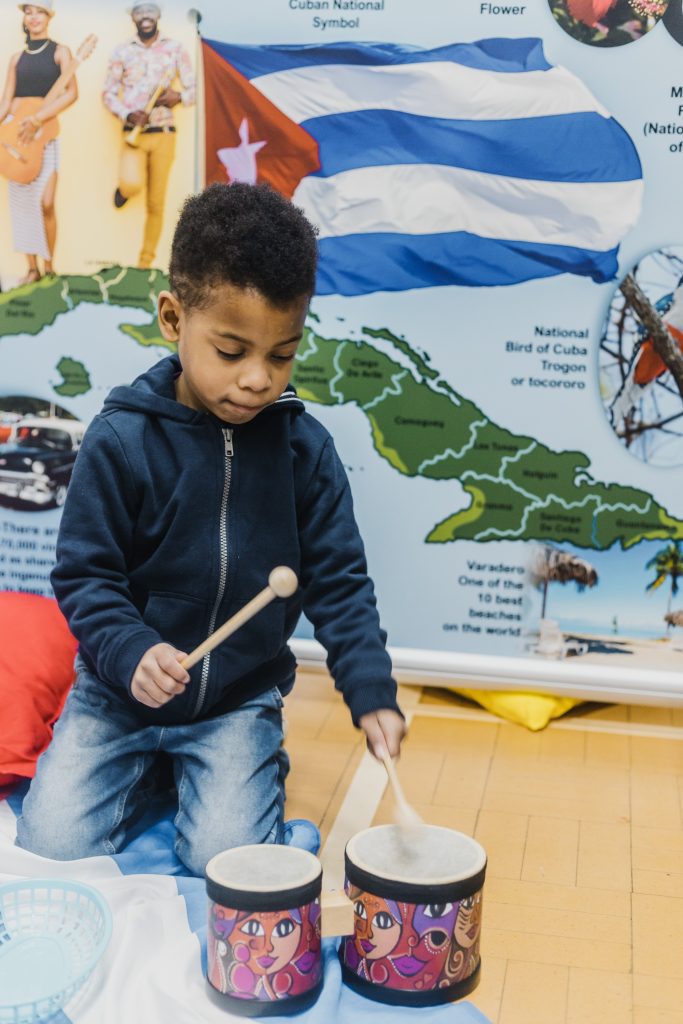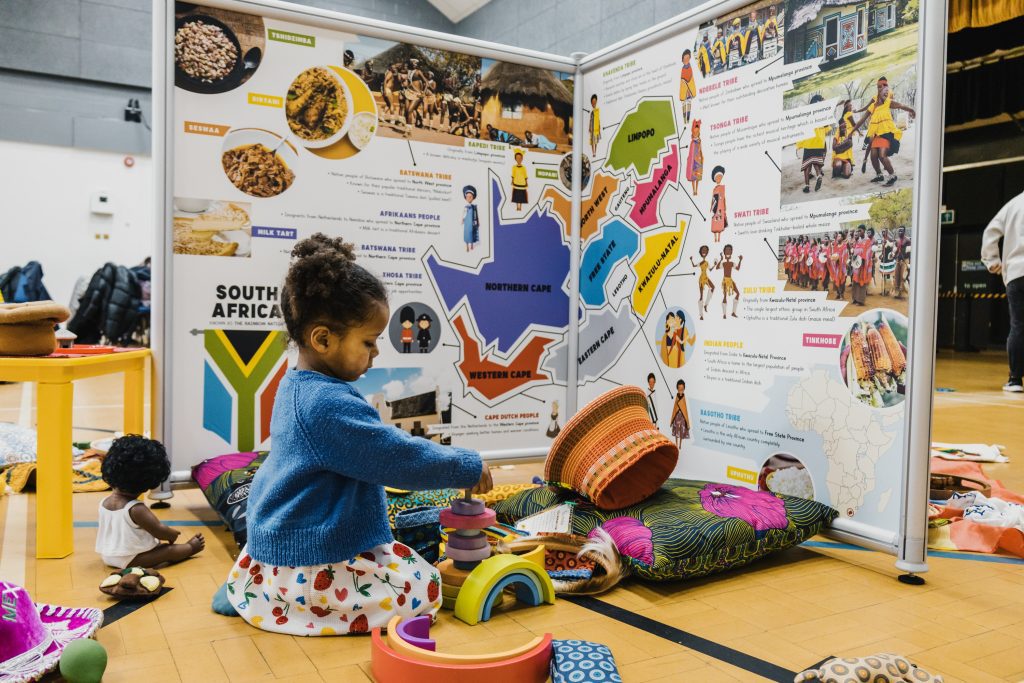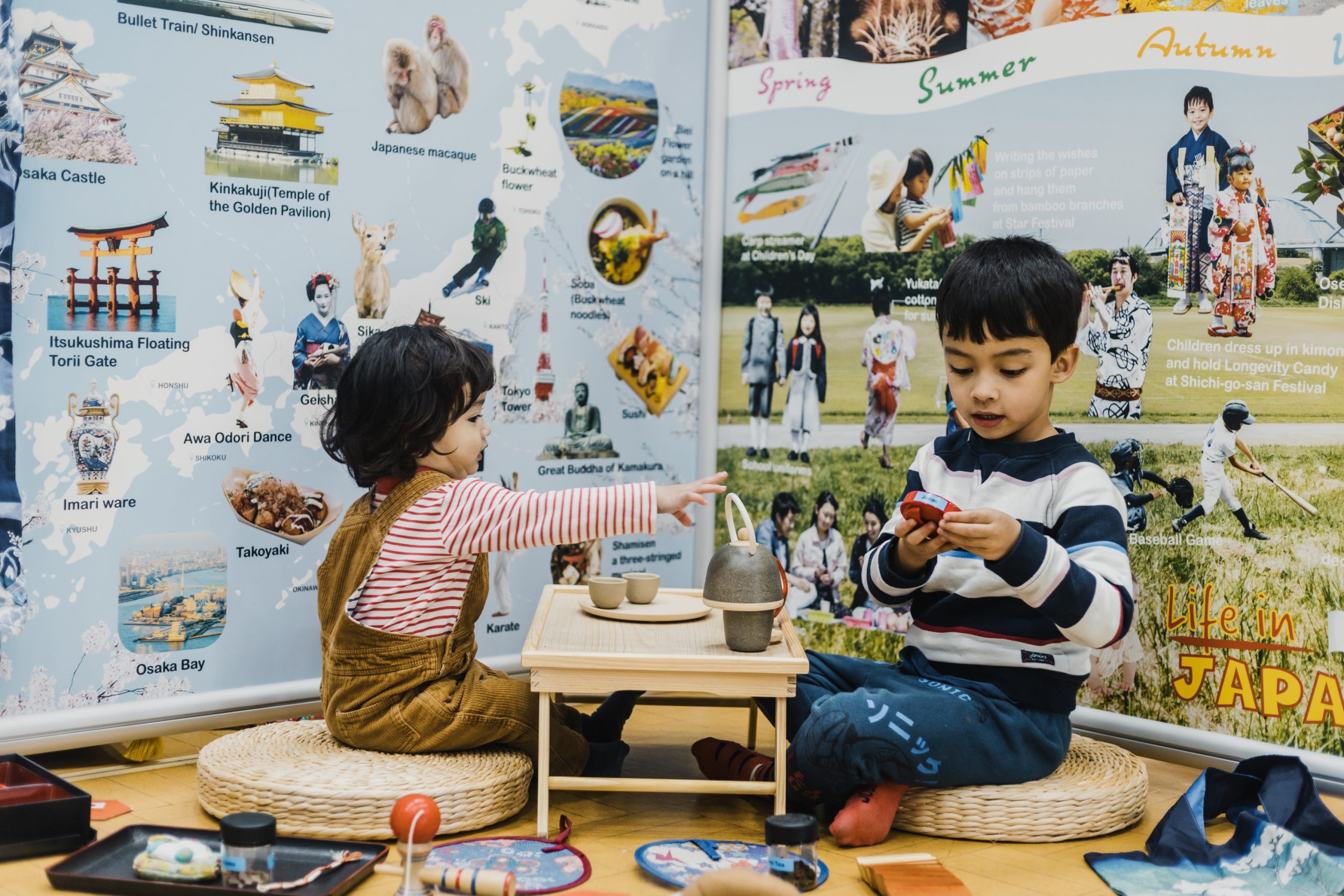Hello, I’m Kate, I run Tiny Travels, a social enterprise which offers children in Devon, fully-immersive sensory sessions to learn about different world cultures. Our sessions are hands-on and very fun! Children can explore crafts from different countries, smell different spices and teas from sensory pots, role-play with our custom-made food items, press musical buttons to hear different languages and play with our vast collection of instruments from around the globe.
Although the sessions are designed for children, they are also very much designed for the adults who are helping to raise them! Our mission is to help children in rural areas, grow up to value, respect and embrace people of all cultural backgrounds by providing a fun learning space where our differences are wholeheartedly celebrated. By involving parents, we hope to encourage deeper thinking about the world and to question how we’ve been taught about different cultures.
Due to racism, Devon can be an inhospitable place for people of global majority backgrounds. If you want to help your child celebrate diversity to grow up to be kind, compassionate and empathetic to all people, there are many things you can do but the best thing to do first is to challenge your own views. So, read on with an open mind and an open heart!

1. Understand that children notice differences and that’s OK!
There is a very common but harmful myth that children don’t see colour, however, countless studies show that children start showing racial bias from age 3. I see this during my sessions with children as young as 2 only wanting to play with the 1 white doll when I have 12 other dolls of various racial backgrounds. This preference of dolls can then lead to racism in the playground with children saying they only want to play with white kids (I’ve heard instances of this happening in reception classes in Devon schools). Without a proactive approach to celebrating differences, the children of today grow up to be the adults of tomorrow – the teachers, lawyers, doctors, managers and police. This is why we have current statistics in the UK like Black women 4x more likely to die in childbirth and Black women 25% more likely to be sent to prison for the same crime as white women. Children notice differences and if we shy away from talking about differences and race, we are giving children the message that differences are something to fear and avoid.
2. Talk about differences positively
When children grow up in areas that lack cultural diversity like Devon, this greatly impacts who they automatically trust, value and respect. However, there is so much you can do to counter this. Regularly talk to your child about differences in a positive way. For example, whilst reading a book – “look at these lovely children, you have light skin and this little girl has darker skin, all skin colours are beautiful and our differences make us special and unique”. Consistently reinforcing these positive associations with difference will help your child learn to value people from all backgrounds. If your child points to someone in the street and says “why does that person have funny hair?”. You can have a chat with them about how all people have different hair textures, hair styles, hair colours and our differences make the world an amazing place. If your child says something like “that’s a weird accent”, you can say “that accent is unfamiliar to you, but it doesn’t make it scary or bad, being bilingual is an incredible skill!”. Help your child understand that we are part of a wonderful world outside of Devon, where people look, speak, learn, dance, worship, play, and think differently. And that is AMAZING.
3. Childproof your home
You’ve bought the plug socket protectors and the stairgates, but what about assessing what messaging your child is being exposed to in their environments. Do they only play with white dolls? Do they only read books with white characters? Are their favourite movie characters all white? Look around at your child’s bookshelf, toys, YouTube shows, movies, do they reflect our wonderful diverse world or are people from the Global Majority portrayed only as sidekicks? Messages of anti-blackness in our culture are widespread and normalised in many children’s books particularly showing black and brown as negative colours (e.g the Colour Monster book). Assessing the environments that your child grows up in to ensure they see people represented of different backgrounds in positive ways will help create a safer world for all children.
4. Weave celebrating diversity in your everyday life
Celebrating diversity is essentially actively divesting from the historical white dominant narrative that is very present in the majority of spaces that our children are growing up in. From baby sensory classes, playgroups to their nursery setting, the toys, books and resources your children are playing with in these spaces are often heavily white-centred. TV shows and books are windows to the world outside of Devon. Buy a library card to get access to free books. Learn yoga moves with your child, honour the origins of yoga and learn about British & Indian history reading this book. Make St Lucian banana bread together and learn about the massive contribution of British Caribbean people who were invited to help rebuild Britain after WW2. Every activity is an opportunity to learn with your child about our interwoven global past and present. Buying books and resources made by global majority owned businesses will help to combat stereotypes and cultural appropriation. This book list has many everyday storybooks but also books to help children build on their compassion, empathy and respect.
5. Learn about your own culture to help respect others!
Every person has a culture and every culture has a history! We may have learnt about tribes in different parts of the world but in the UK, we have different people groups: Scottish, Irish, Welsh and English but we don’t call them tribal groups, we say Welsh people for example, using the same language will help increase respect. Within areas there are regional cultures, like South West culture and we have differences within this region. For example, Cornwall and Devon have different ways of making cream tea. Neither one is wrong or more superior despite our views, they are just different. Everyone has cultural identities and when we learn about our own culture and own history, we can be more aware of stereotypes and more respectful when learning about cultures different to our own. We can also learn about our similarities, like celebrations where all families eat dinner together, share gifts, listen to music and dress up like the Christian and Muslim holidays of Christmas and Eid.

Conclusion
Young children are tiny sponges and between 0-5 years their brains are developing faster than at any other time in their lives. In areas like Devon which are lacking in cultural diversity because of racism, it is even more important to have pro-active conversations about race and difference in your child’s formative years. Doing so has the powerful potential to change the world.
Tiny Travels sessions are recommended by Devon County Council to help celebrate differences in order to help combat racism from a young age. I offer nursery sessions, school visits, play group pop-ups as well as courses, birthday parties and event bookings.
If you would like to learn more, I have organised a fully-funded webinar by UKs leading expert in anti-racism in the Early Years, Liz Pemberton. Never underestimate the small changes that you can make to create a more equal future for all.

